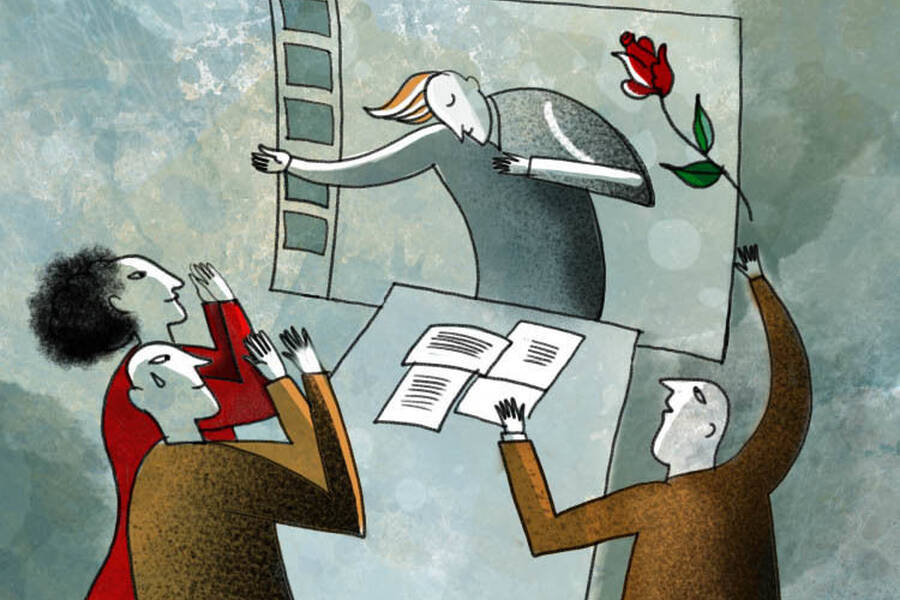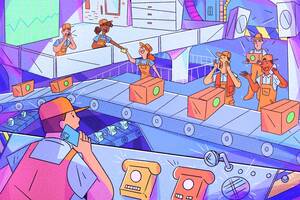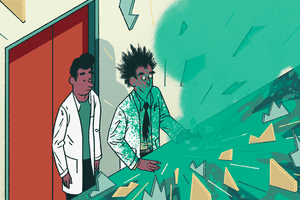“The idea that one gets stronger through failure is the kind of stiff advice that people may tell themselves in difficult times,” says Kellogg strategy professor Benjamin Jones. Indeed, this idea has taken on new life in the “fail fast, fail often” mentality of startups, where it’s accepted that striking out is not just something to be endured, but a critical step on the path to success.
But how true is this widely held belief? And when, exactly, can failure be a boon?
Kellogg faculty weigh in on the surprising benefits of failing and how you can own—and even profit from—your mistakes.
You may be glad to forget failures from early in your career, like the coveted internship you failed to nab, or that huge sale that you flubbed at your first job. (Sorry to remind you.)
But there’s evidence that those setbacks might help you out in the long run. In a study, professors Dashun Wang and Benjamin Jones and postdoctoral researcher Yang Wang found that early failure can in fact breed later success.
The researchers compared scientists who narrowly missed out on a prestigious federal grant with scientists who narrowly qualified for the grant. It turned out, ten years down the line, those who didn’t get the grant ended up publishing more successful papers than those who did.
In the long run, “the losers ended up being better,” Wang says.
Why? The researchers tested several possible explanations—for instance, that failing to get the grant “weeded out” the weakest scientists, leading only the higher performers to keep writing papers. But even when they accounted for that (by artificially weeding out a similar number of scientists who did get the grant), the losers still outperformed the winners.
That left the researchers to conclude that adversity itself was what pushed the rejected scientists to succeed. “Failure is devastating,” says Wang, “and it can also fuel people.”
Why do some individuals who experience failure ultimately succeed, when so many others never manage to get past their failing phase?
In another paper, Dashun Wang and Yang Wang, along with colleagues, developed a mathematical model to pinpoint what separates those who succeed from those who merely try, try again. The researchers found that success comes down to learning from one’s prior mistakes—for instance, continuing to improve the parts of an invention that aren’t working rather than scrapping them, or recognizing which sections of a denied application to keep and which to rewrite.
But it’s not simply that those who learn more as they go have better odds of victory. Rather, there’s a critical tipping point. If your ability to build on your earlier attempts is above a certain threshold, you’ll likely succeed in the end. But if it’s even a hair below that threshold, you may be doomed to keep churning out failure after failure forever.
“People on those two sides of the threshold, they could be exactly the same kind of people,” says Dashun Wang, “but they will have two very different outcomes.”
Of course, not all failures have a positive effect on your career output. Sometimes what looks like a setback really is just a setback. So how can you make lemonade out of the sour lemons of your past?
By weaving them into your personal story, says Craig Wortmann, a clinical professor of innovation and entrepreneurship. Convincing potential colleagues that you would be a great collaborator and partner requires you to tell a coherent, powerful story that encapsulates your strengths—and tales of your failures can help you do just that.
When deployed correctly, Wortmann says, your failure anecdotes can show character, reveal your skills as a leader, or demonstrate your drive. So when is the right time to trot out one of your go-to failure stories? Maybe when you’re talking to a potential client, Wortmann says. “By doing this, you show that you’re humble, that you’re a learner, and that you’re good to work with.”
For instance, Wortmann recalls hearing a CEO tell a “funny failure” story that revealed how he learned the value of asking good questions. The CEO described spending an entire summer talking to a contact at a global consumer-packaged-goods company, working to cultivate a relationship he hoped would lead to a major business opportunity. On their fourteenth phone call, he grew impatient and asked his contact when her company would be signing the contract—at which point she informed him that she was an intern.
“She thanked him for all she had learned that summer,” Wortmann says. “It turned out she wasn’t a prospect at all. She was a college student. But he never asked her.”
Useful as failure can be, that doesn’t mean that people are eager to take the blame for a mess-up.
Except in the military, that is.
On a visit to the U.S. Army’s National Training Center, professor Ned Smith remembers seeing soldiers of every stripe and rank stepping forward to incriminate themselves in after-action reviews and debriefings. “It wouldn’t be much of an overstatement to say that they are almost competing to take the blame,” he says.
Smith and Col. Brian Halloran, formerly a U.S. Army Chief of Staff senior fellow at Kellogg, considered how the Army cultivates this culture of accountability.
One useful quirk: officers compete across the entire army for promotions. Since evaluators on the promotion review board aren’t supervising the officers they are evaluating, those officers have less incentive to save face after they make a bad call.
“When a leader knows that what matters are the overall performance of the unit and the improvement of the unit as a whole, they are far more likely to openly discuss what didn’t go right,” Halloran says.
Imagine you’ve spent months developing and perfecting a product. You finally run a focus group to get reactions to the product, and the focus group participants are thrilled. Your new product is all but guaranteed to fly off of the shelves—right?
Before you start marketing it as “the next big thing,” it might be worth asking who, exactly, was in that focus group. Professor Eric Anderson found evidence that there’s a class of customers out there who are uncannily attracted to products that will never catch on. Those people who tended to purchase a notorious failed product like Diet Crystal Pepsi were also more likely to purchase other doomed products like Frito Lay Lemonade.
Anderson deems these consumers “harbingers of failure,” and for good reason.
“What seems to be happening is these customers have preferences that might be nonmainstream,” he says. “We know when they really like your product, it shows that your product really appeals to a narrow group of customers.”
Anderson’s research suggests some simple ways that market researchers can weed out niche products before they have a chance to flop. Importantly, firms should ask customers not only whether they would buy the product in question, but also what other products they regularly buy. A customer who buys Swiffer products, for instance, probably has fairly mainstream tastes and should be trusted.
But if the biggest fan of your newest widget is still pining after that unusually flavored beer that was only on shelves for a month, “you may not want to launch this product, because it’s probably not going to have the mainstream appeal that sustains products for the long run,” Anderson says.




